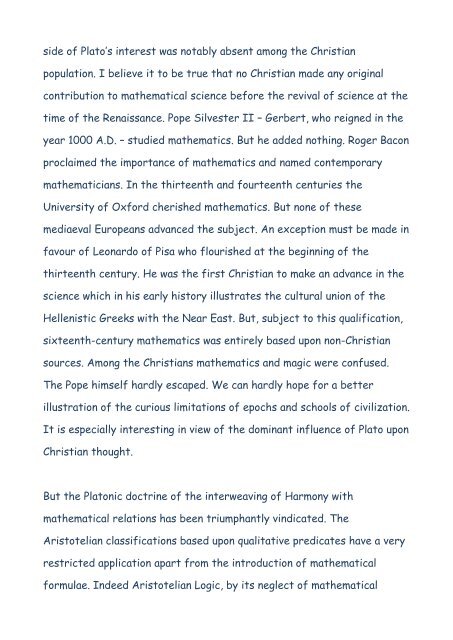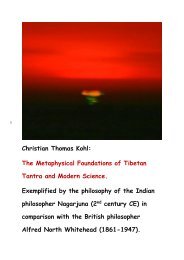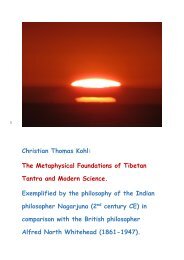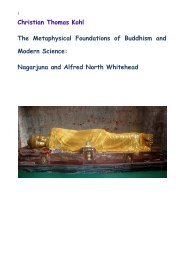The Metaphysical Foundation of Buddhism and Modern Science
Create successful ePaper yourself
Turn your PDF publications into a flip-book with our unique Google optimized e-Paper software.
side <strong>of</strong> Plato’s interest was notably absent among the Christian<br />
population. I believe it to be true that no Christian made any original<br />
contribution to mathematical science before the revival <strong>of</strong> science at the<br />
time <strong>of</strong> the Renaissance. Pope Silvester II – Gerbert, who reigned in the<br />
year 1000 A.D. – studied mathematics. But he added nothing. Roger Bacon<br />
proclaimed the importance <strong>of</strong> mathematics <strong>and</strong> named contemporary<br />
mathematicians. In the thirteenth <strong>and</strong> fourteenth centuries the<br />
University <strong>of</strong> Oxford cherished mathematics. But none <strong>of</strong> these<br />
mediaeval Europeans advanced the subject. An exception must be made in<br />
favour <strong>of</strong> Leonardo <strong>of</strong> Pisa who flourished at the beginning <strong>of</strong> the<br />
thirteenth century. He was the first Christian to make an advance in the<br />
science which in his early history illustrates the cultural union <strong>of</strong> the<br />
Hellenistic Greeks with the Near East. But, subject to this qualification,<br />
sixteenth-century mathematics was entirely based upon non-Christian<br />
sources. Among the Christians mathematics <strong>and</strong> magic were confused.<br />
<strong>The</strong> Pope himself hardly escaped. We can hardly hope for a better<br />
illustration <strong>of</strong> the curious limitations <strong>of</strong> epochs <strong>and</strong> schools <strong>of</strong> civilization.<br />
It is especially interesting in view <strong>of</strong> the dominant influence <strong>of</strong> Plato upon<br />
Christian thought.<br />
But the Platonic doctrine <strong>of</strong> the interweaving <strong>of</strong> Harmony with<br />
mathematical relations has been triumphantly vindicated. <strong>The</strong><br />
Aristotelian classifications based upon qualitative predicates have a very<br />
restricted application apart from the introduction <strong>of</strong> mathematical<br />
formulae. Indeed Aristotelian Logic, by its neglect <strong>of</strong> mathematical


















